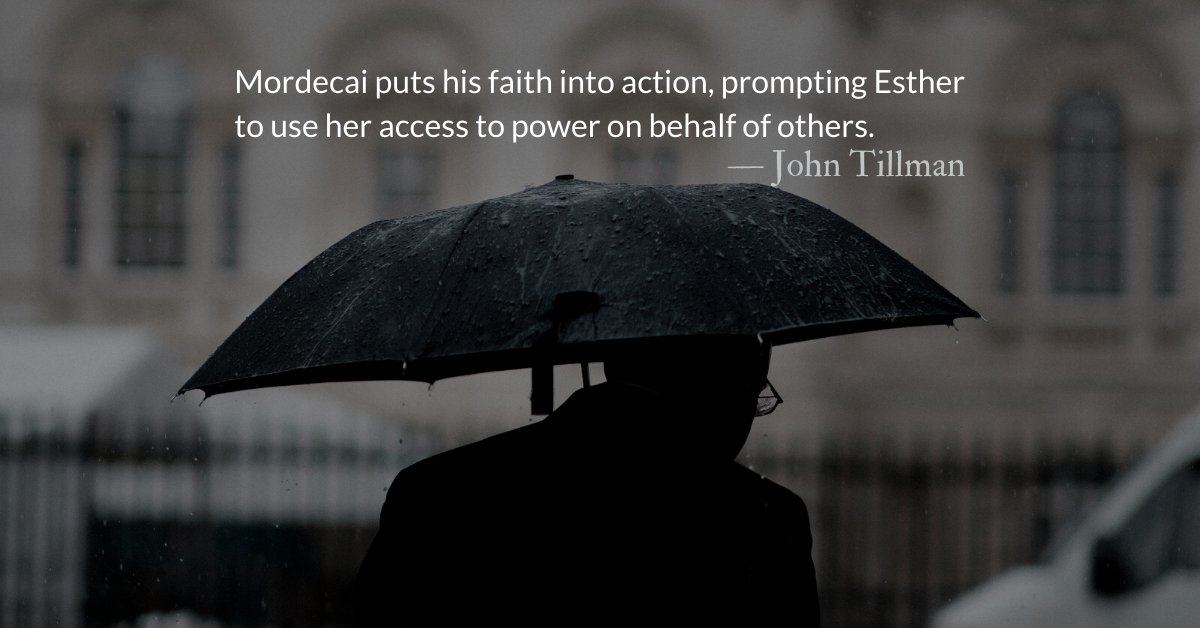Scripture Focus: Esther 4.13-14
Do not think that because you are in the king’s house you alone of all the Jews will escape. For if you remain silent at this time, relief and deliverance for the Jews will arise from another place, but you and your father’s family will perish. And who knows but that you have come to your royal position for such a time as this?”
Luke 12.48
From everyone who has been given much, much will be demanded; and from the one who has been entrusted with much, much more will be asked.
Reflection: The Purpose of Power
By John Tillman
The idea that the rich can’t be bought is a fallacy. In some cases, saying the rich can’t be bought is like saying an alcoholic won’t want another drink.
Xerxes, the emperor and the richest man in any room, signs off on the killing of the Jews without even knowing who they are due to what amounts to a large bribe. Even though the king says to Haman, “Keep the money,” the rest of the book indicates that Haman paid it or intended to pay it. (Esther 3.11; 4.7; 7.3-4)
Despite the corruption of the government, Mordecai has faith that help will arise. But he does not simply wait and hope. Mordecai puts his faith into action, prompting Esther to use her access to power on behalf of others. Esther’s concerns of danger and personal risk don’t dissuade Mordecai. As much as Mordecai loves Esther like a daughter, part of his message to her is chilling—you won’t be safe.
Mordecai assures Esther that her privileged position won’t save her. As confident as Mordecai is that God will act to save his people, he is also confident that God will act in judgment against those who stand by and watch as the helpless are crushed.
After prayer and fasting, Esther’s concerns for her own life disappear and her purpose is clarified. The purpose of Esther’s power is to serve others. So it is with us. (Luke 12.48)
God’s help will arise for the oppressed. When there is suffering, when there is oppression, when there is distress in the land and leaders who callously allow people to die for profit, God will move. The only question is, will the people of God join him?
As we observe our community and our country, let us open our eyes as Esther’s eyes were opened to the dangers, suffering, and oppression around us.
Let us humbly consider how privileged we are and know in our hearts that God will not hold us innocent for failing to care for the poor and downtrodden.
Let us place our security and our lives in God’s hands as Esther did, and let us boldly step in front of the powerful who are doing wrong and say, “stop this.”
Divine Hours Prayer: The Morning Psalm
Let your ways be known upon earth, your saving health among all nations.
Let the peoples praise you, O God; let all the peoples praise you.
Let the nations be glad and sing for joy, for you judge the peoples with equity and guide all the nations upon earth. — Psalm 67.1-4
– From The Divine Hours: Prayers for Autumn and Wintertime by Phyllis Tickle.
Today’s Readings
Esther 4 (Listen -2:53)
Acts 27 (Listen -6:09)
Read more about In Denial about Greed and Power
Ezekiel’s purposely shocking parable is intended to connect the established shame of sexual sins to the sins Israel was unashamed of—greed and pursuit of power.
Read more about The Exodus and The ReturnT
he testimony of Ezra tells us that kings come and go, but it is the Lord who is our only hope and protector.







